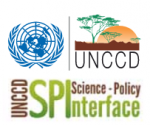The Science-Policy Interface (SPI) of the UN Convention to Combat Desertification (UNCCD) has published its first "Science-Policy Brief." The brief provides an overview of key facts and figures, as well as policy recommendations, for optimizing the contribution of soil organic carbon in mitigating climate change and increasing agro-ecosystem resilience through improved soil quality.
 16 November 2015: The Science-Policy Interface (SPI) of the UN Convention to Combat Desertification (UNCCD) has published its first “Science-Policy Brief.” The brief provides an overview of key facts and figures, as well as policy recommendations, for optimizing the contribution of soil organic carbon in mitigating climate change and increasing agro-ecosystem resilience through improved soil quality.
16 November 2015: The Science-Policy Interface (SPI) of the UN Convention to Combat Desertification (UNCCD) has published its first “Science-Policy Brief.” The brief provides an overview of key facts and figures, as well as policy recommendations, for optimizing the contribution of soil organic carbon in mitigating climate change and increasing agro-ecosystem resilience through improved soil quality.
The policy brief states that the first metre of soil contains “more than twice the amount of carbon in the atmosphere, and about three times the amount that resides in the world’s vegetation.” It also notes that, after energy, the “Agriculture, Forestry, and Other Land Use” (AFOLU) is the largest greenhouse gas emitting sector, accounting for 24% of total emissions. The brief estimates that the world’s croplands, grazing lands and rangelands have lost 25–75% of their original soil organic carbon pool of 42-78 gigatons (Gt), of which roughly half was due to desertification, and pegs the economic costs of associated ecosystem service value losses at around US$6.3 – 10.6 trillion annually.
Among key policy conclusions, the brief highlights that: building soil carbon through soil management is the most viable option for carbon sequestration in the biosphere; the act of maintaining and increasing soil organic carbon provides multiple global benefits simultaneously; and ensuring full accounting of soil organic carbon as a terrestrial carbon sink under a future climate agreement “is both essential and feasible.”
Drawing on diverse case studies of smallholder sustainable land management (SLM) initiatives in African countries, the brief concludes that reaching 95% of potential maximum crop yields through such practices could create an additional 2.3 billion tonnes of crop production per year, equivalent to a potential gain of US$1.4 trillion. It notes, however, that maximizing the potential return on investment in SLM practices requires a strategic, integrative approach across the efforts to respond to “the grand environmental challenges of our time” – climate change, land degradation and biodiversity loss.
Among specific follow-up actions, the brief proposes: capitalizing on land-based approaches to climate change mitigation and adaptation; incentivizing SLM practices such as mulching, zero tillage, green manuring and water harvesting; and ensuring a full and integrated accounting of soil carbon.
The UNCCD’s SPI was formally established in 2011 at the 11th session of the Conference of the Parties (COP 11) to the UNCCD. At COP 12, which took place in Ankara, Turkey, in October 2015, Parties requested the SPI to develop policy briefs on the latest scientific research with regard to desertification/land degradation and drought (DLDD) and land-based adaptation to, and mitigation of, climate change. [Science-Policy Brief 01-November 2015: Pivotal Soil Carbon] [UNCCD Publications] [IISD RS Sources]